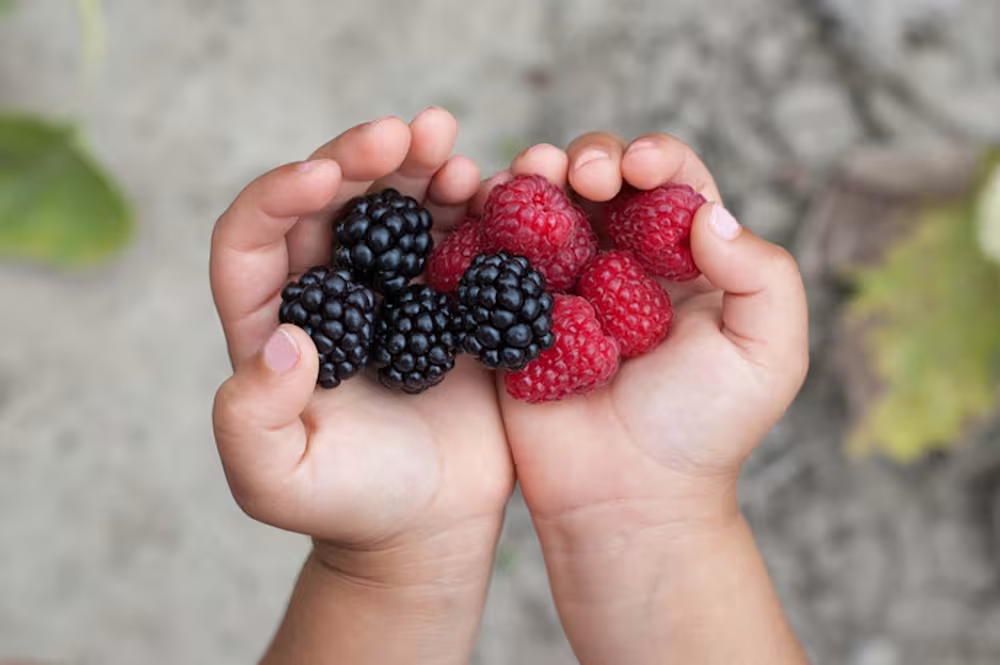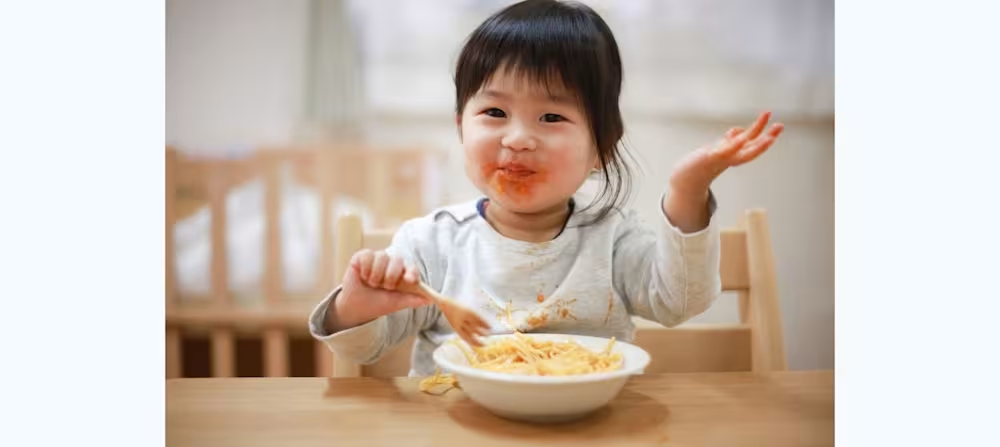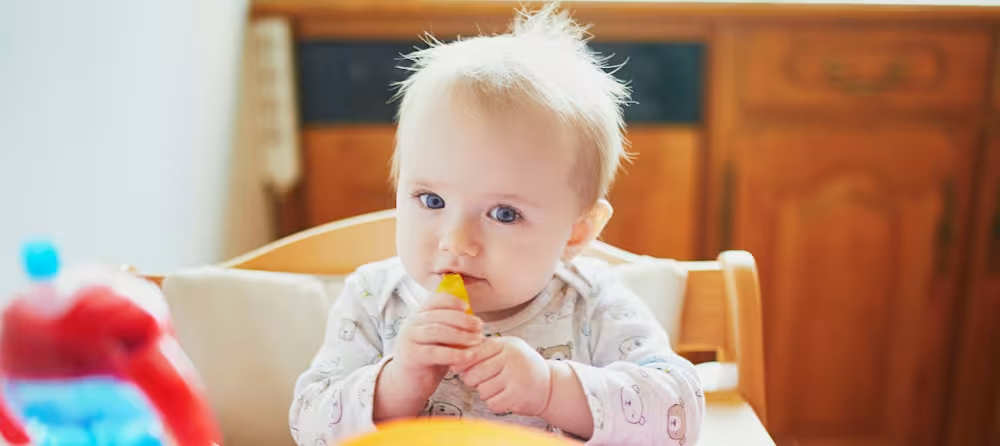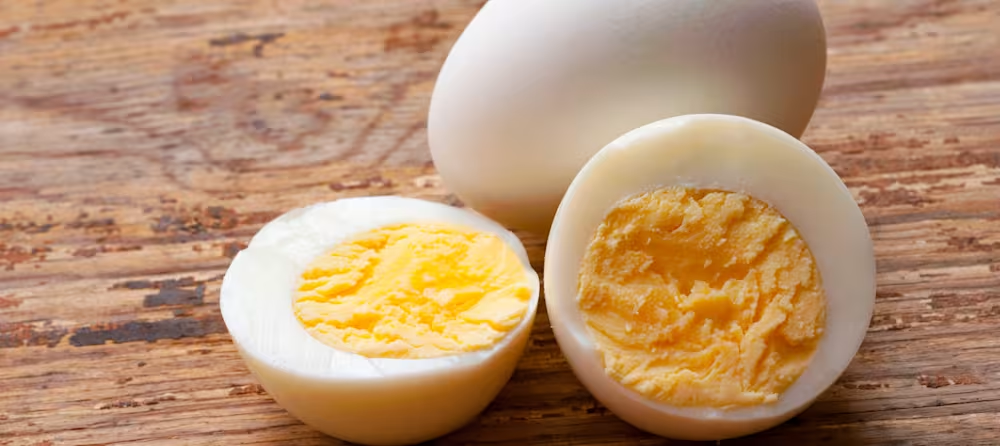10 ways to help your kid stop throwing food
Updated Jan 12, 2026

In order to develop proper feeding skills, babies and toddlers need time to explore and play with food — including, at times, throwing it! While it isn’t the most fun part of feeding, it’s totally normal. Keep reading to find out the many reasons why little ones throw food and what to do about it.
Why do babies and toddlers throw food on the floor?
No one ever said feeding babies and toddlers would be anything but a messy experience, but why does so much food end up on the floor? No matter which feeding method you end up choosing, at some point, your little one will experiment with throwing food. While it can be hard to know exactly why they are doing it, here are a handful of common reasons.
Exploring cause and effect
Around 8 months, babies begin to understand the concept of cause and effect, and mealtime becomes another opportunity to test their new knowledge. What happens if I push my food off the tray? Will mom or dad pick it back up? Let’s see what happens.
Not hungry or done with the meal
Is your baby or toddler immediately pushing food from their tray or table? They might not be hungry enough to eat. If they start part way through the meal, consider that may be their way of telling you they’re finished eating.
Seeking attention
Sometimes babies and toddlers just want our attention and throwing food is one way to get it. Oftentimes, this behavior gets a reaction from a parent or caregiver and they like that — even if they are being told to stop doing what they are doing!
Too much food on their plate
Many little ones get overwhelmed easily by the amount of food they are served. When they don’t know what to do with it all, they do what they can to clear some space.
Don’t like the food
This is more common in toddlers, who are quickly learning how to express their opinions. When toddlers don’t like a certain food, it often becomes their top mission to get it off their plate.
They’re frustrated
Eating is hard work for babies and toddlers! When food is difficult to eat because they can’t pick it up, hold on to it or chew it well, they may become frustrated and throw it on the floor.
Babies throwing food on the floor: ages 6 to 12 months
Many babies are simply testing cause and effect when they throw or drop food as they start solids or . They want to know what happens when food falls off the tray! Other reasons babies throw food include being bored, tired, or simply not hungry at mealtime. At this age, dropping food may or may not be intentional.
Toddlers throwing food on the floor: 1 to 3 years
To have a toddler is to know they love to test limits — including at mealtime! When a toddler throws food, they often do so intentionally to see just how much they can get away with. Additionally, they may be seeking attention or simply trying to tell you they do not like or want the food being served.
10 tips to get babies and toddlers to stop throwing food
1. Start with less food
Offer a small amount of food to start. Babies and toddlers typically find this to be more manageable and it’s easy to give them more if they want it. Plus, if they still push or throw food on the floor, there’s less to clean up.
2. Remain calm
Babies and toddlers love to see their parents react — even if it is for something they aren’t supposed to be doing. So do your best not to react and to remain calm. If your kiddo sees they aren’t going to get a big reaction out of you, the behavior of throwing food usually will subside.
3. Use a “no thank you” bowl
Give opinionated toddlers a place to put the food they don’t want by setting out a “no thank you” bowl. Coach them to put food into the bowl instead of throwing it. Picking up the food and moving it counts as a food exposure, so it’s a win even if they don’t try it.
4. Mark a place for cups and utensils
Food isn’t the only thing toddlers like to throw - sometimes cups and utensils end up on the floor too. Reinforce verbally that they belong on the table and give them a specific place to put them back. Put a sticker or some painter's tape where they should place the cup or utensil when they are done with it.
5. Teach your kiddo to say “all done”
Many babies and toddlers start throwing food when they are done with their meals. In order to combat this, consider teaching them another way. Try or if they can talk, teach them the phrase “all done.”
6. Let them leave the table
Babies and toddlers do not have very long attention spans and expecting them to sit through a whole meal may be unrealistic. Allow babies and toddlers to get down from the highchair when they are done eating. The longer they sit after they feel like they are done, the more likely they are to start throwing food.
7. Make sure they are hungry
If your child is not hungry at mealtime, they will often look for something else to do — like throw food! If needed, adjust your feeding schedule to allow them to come to the table hungry. For babies, allow 30 - 60 minutes after breast milk or formula. For toddlers, make sure it’s been 2 - 3 hours since their last meal or snack.
8. Adjust the size, shape, or texture of the food
Double-check the food you are serving to ensure it is appropriate for your baby or toddler’s feeding ability. Eating is a new skill and if it becomes too difficult, they may not want to do it. Make sure the food is the right size and that the texture is soft enough for them to chew.
9. Use positive language
Words can be powerful when it comes to kids. when they throw food and tell them what you want them to do as opposed to what you do not want them to do. For example, say “food belongs on the table” instead of “no, don’t throw food.”
10. Sit together during mealtime
Give your baby or toddler focused attention while you eat together at mealtime. This allows you to intervene and stop throwing it in its tracks. Baby having trouble picking up food? Adjust the size. Toddler doesn’t like a food? Assure them they don’t have to eat it.
Takeaway
Food throwing is developmentally normal: Babies and toddlers often throw food as part of learning cause and effect, expressing preferences, or signaling they’re done eating.
Behavior often has a clear message: Hunger, frustration, boredom, or dislike of a food can all show up as food hitting the floor, especially when kids don’t yet have the words to explain themselves.
Your response matters: Staying calm, using positive language, and avoiding big reactions can help reduce food throwing over time.
Minor adjustments can make a difference: Serving less food at one time, adjusting textures, and offering alternatives like a “no thank you” bowl give kids appropriate ways to communicate.
This phase will pass: With consistency, patience, and age-appropriate expectations, most children outgrow food throwing as their feeding skills and communication improve.
Share article:
Note: The content on this site is for informational purposes only and should not replace medical advice from your doctor, pediatrician, or medical professional. If you have questions or concerns, you should contact a medical professional.
Share article:






